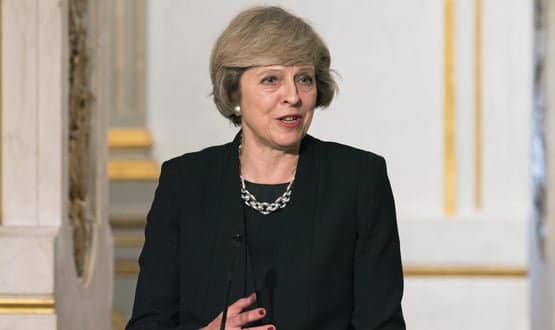The Prime Minister has announced plans on how artificial intelligence (AI) can be used to help diagnose cancer.
Speaking in Macclesfield, Theresa May said the NHS and technology companies should use AI as a “new weapon” in research, adding that the UK will use “data, artificial intelligence and innovation” to transform the way diseases like cancer, diabetes, heart disease and dementia are diagnosed by 2030.
Mrs May said she hopes to see computer algorithms sorting through patient’s medical records, genetic data and lifestyle habits to try and spot cancer early on.
She said: “Late diagnosis of otherwise treatable illnesses is one of the biggest causes of avoidable deaths.
“And the development of smart technologies to analyse great quantities of data quickly and with a higher degree of accuracy than is possible by human beings opens up a whole new field of medical research and gives us a new weapon in our armoury in the fight against disease.
“Achieving this mission will not only save thousands of lives. It will incubate a whole new industry around AI-in-healthcare, creating high-skilled science jobs across the country, drawing on existing centres of excellence in places like Edinburgh, Oxford and Leeds – and helping to grow new ones.”
It is hoped the plans will see at least 50,000 people each year diagnosed at an early stage of prostate, ovarian, lung or bowel cancer.
Despite welcoming more high quality research into diseases, privacy campaign group, Med Confidential, tweeted concerns about data privacy.
commenting ahead of the PM's speech tomorrow, @medConfidential said:
“More high quality research into diseases is always welcome; will patients know that this is how their data is used, and will these projects respect the opt out that launches on Friday?"— medConfidential (@medConfidential) May 20, 2018
Elsewhere, Harpal Kumar, chief executive officer of Cancer Research, said the plans are pioneering but added that the government must ensure that the “right infrastructure” is embedded in the UK’s health system.
The use of AI in healthcare is a hot topic in medic circles.
Earlier this month, the government launched an independent review into the training needs of NHS staff to use AI and robotics technology.
Jeremy Hunt, Secretary of State for Health and Social Care, announced the review will be led by Dr Eric Topol, an expert in cardiology, genetics and digital medicine.
Dr Topol will look at opportunities where the NHS could invest in training for its tens of thousands of members of staff.
He will also consider the implications of the skills required of future healthcare professionals.


23 May 2018 @ 05:55
IT is money that is key NOW, or more precisely the abiloty to count it, efficiently and accurately. There is nothing wrong with making money. You use DATA to count the money and you use DATA for research.
22 May 2018 @ 17:21
This seems to be another opportunity for companies to make money.
Where is the evidence that this would be of benefit?
Where are the staff do perform all the extra scans etc that will be required?
Where are the staff and finances to pay the VOMITs (Victims of medical Investigation and Treatment) that will suffer side effects from subsequent invasive investigations and unnecessary treatment?
Let’s keep it real. The cost of paying for the above will greatly outweigh any potential savings – if only because of all the extra tests and treatments.
remember, the last 6 months of your life are the most expensive for the NHS, and they will come around regardless of the success or otherwise of AI-based early diagnosis, even if successful. Treat the cancer, pateint dies a few years later with Alzheimers, chronic infection or whatever! Death is the only certainty of our lives [and taxes, of course, for those who earn an income].
22 May 2018 @ 09:58
Excellent.
We at Sollis already provide one of the foremost population health management solutions in the UK, and are already working with an International specialised health AI company, planning to (I) use the data to identify cancers at an earlier stage, and (ii) to make that analysis available to clinicians (GPs) through the Population health system..
It is great that this is now moving up the agenda.
21 May 2018 @ 10:02
This is great news. I have identified a revolutionary new digital communication channel specifically aimed at (but not exclusive to) the Disabled Community which would connect healthcare and people’s physical activity & behaviour which would assist the AI platforms and their algorithms to determine individual lifestyles and habits – but have struggled for more than 2 years now to get backup support for driving this project forward. Please get in touch for more info.